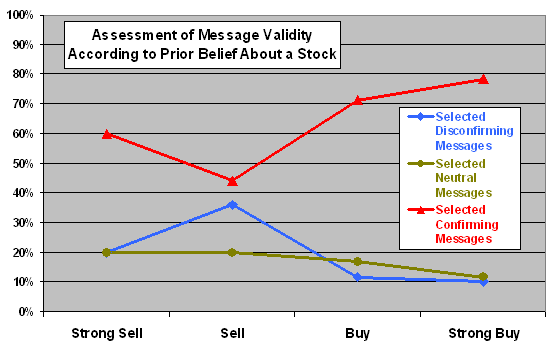Is participation in stock message boards/forums a net plus or net minus for the typical investor? In their July 2010 paper entitled “Confirmation Bias, Overconfidence, and Investment Performance: Evidence from Stock Message Boards”, JaeHong Park, Prabhudev Konana, Bin Gu, Alok Kumar and Rajagopal Raghunathan investigate how investors process message board information and analyze the impact of message processing on return expectations and investment performance. Using an incentivized online experiment conducted via the South Korean Naver.com message board to measure prior beliefs, information processing behavior and expected performance of 502 individual investors during October 7-21, 2009, they find that:
- Investors exhibit confirmation bias in their use of stock message boards, with prior beliefs substantially predicting assessment of message validity (see the chart below).
- In general, the stronger the confirmation bias of an investor…
- The higher the investor’s expectations for returns.
- The more often the investor trades.
- The lower the investor’s actual performance (based on post-survey stock performance).
- In contrast, investors with a higher level of self-assessed knowledge tend to be less motivated to confirm their beliefs via the opinions of others.
- Level of online investing experience and amount invested do not significantly affect the strength of confirmation bias.
The following chart, constructed from data in the paper, summarizes participant assessment of test message validity according to prior belief about the stock (Strong Sell, Sell, Buy and Strong Buy) in response to the following three questions:
- Which opinion appears to have the most widespread support?
- Which opinion appears to be most strongly backed by news about the stock?
- Which opinion appears to have the most convincing argument?
The chart shows that all four categories of prior belief tend to select messages that confirm belief, although the margin of bias is small for the Sell category. Confirmation bias tends to be larger for investors with positive beliefs and strong beliefs about a stock. The low results for neutral messages suggests greater interest in opinion than information.

In summary, experimental evidence indicates that participation in stock message boards/forums increases a typical investor’s propensity to trade and decreases actual investment performance. Investors may want to factor this effect into their information search and processing practices.
The study depends substantially on participant self-selection and on self-reporting of most variables (such as trading frequency), with attendant doubt about sample representativeness and measurement accuracy.